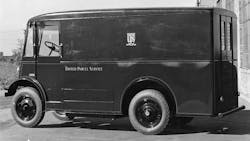While they promise substantially lower operational and maintenance costs over time, all-electric trucks so far haven't been able to beat their diesel or gasoline counterparts in their initial price tag. Global parcel delivery giant UPS, long an investor in energy sustainability and alternative fuel initiatives, is looking to change things by overcoming that "key barrier to large-scale fleet adoption."
The company has engaged Workhorse Group to build it an all-electric Class 5 delivery van that will be "comparable in acquisition cost" to an equivalent conventional fuel van — and that's apples-to-apples, with no special subsidies included for the electric.
If Workhorse pulls it off, it would make the argument against electric trucks a more difficult one for fleets whose duty-cycle needs match up. Notably, another Class 5 battery-electric delivery van unveiled recently that garnered some attention, the Chanje V8070, has promised big cost advantages in the long run for fleet use but is expected to carry an initial premium vs. diesel- or gasoline-powered vans.
UPS also announced last fall that it's working with Unique Electric Solutions, LLC to develop an electric conversion kit initially for its vans operating in lower Manhattan, New York City. That effort is being supported by $500,000 grant from the New York State Energy Research and Development Authority and will utilize Unique Electric's switched reluctance motor, or SRM, technology. Compared with most electric motors, which use permanent magnets, SRMs have a simpler design with no permanent magnets, lowering acquisition and long-term operating costs.
Slideshow: UPS has quite a history with electric vehicles — the company released photos of its electric trucks dating back to 1935 (see below) and included an artist's rendering of the planned new Workhorse all-electric trucks.
But in this latest endeavor, UPS said it will deploy 50 of the planned new plug-in electric trucks from Workhorse. The vehicles will offer a nearly 400% fuel efficiency improvement over conventional fuel vehicles, according to Workhorse, although the accounting for that claim is yet to be seen; it would need to compare per-mile costs for fuel vs. those of electricity for charging. Workhorse also said the electric delivery vans will have about a 100-mi. range between charges and will have a cab-forward design to optimize driver compartment and cargo area and reduce weight.
"Our goal is to make it easy for UPS and others to go electric by removing prior roadblocks to large-scale acceptance such as cost," Steve Burns, Workhorse's CEO, said in a statement. UPS noted that it plans to put the 50 electric delivery vans to use in urban areas including Atlanta, Dallas and Los Angeles.
"The all-electric trucks will deliver by day and re-charge overnight," said Carlton Rose, president of global fleet maintenance and engineering at UPS. "We are uniquely positioned to work with our partners, communities and customers to transform freight operation."
After Workhorse and UPS have designed the electric van "from the ground up" and produced prototypes, the companies will tweak the design for larger-scale production. UPS said it intends to make these new electric trucks "a standard selection" for its fleet, noting that it operates some 35,000 diesel or gasoline trucks "in routes with duty cycles or daily miles traveled similar to the new electric vehicles," meaning those could be replaced out with all-electric vehicles.
It's not the only all-electric trucks UPS is pursuing. The company has pre-ordered 125 of Tesla's planned electric semi-trucks and has purchased three of Mitsubishi-Fuso's eCanter medium-duty electric trucks as well to put to use in its fleet. UPS already operates more than 300 electric vehicles in use in the United States and Europe and has said that by 2020, it wants one out of every four vehicles it purchases to be either alternative fuel or advanced technology like the planned all-electric delivery vans from Workhorse.
In its "Rolling Lab" — a growing fleet of more than 9,000 alternative fuel and advanced tech vehicles — UPS has been using and testing Workhorse's hybrid-electric E-GEN trucks for some time. Those run on battery power and feature a small gasoline "Range Extender" engine that kicks in and acts as a generator to provide power when the batteries are depleted, and can also use Workhorse's Horsefly drone to deliver packages.
About the Author
Aaron Marsh
Aaron Marsh is a former senior editor of FleetOwner, who wrote for the publication from 2015 to 2019.
